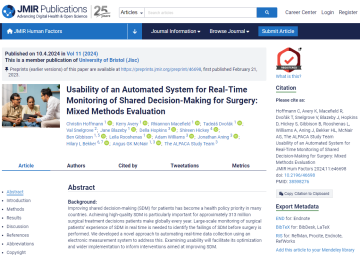Real-time capturing of shared decision making experiences in surgery acceptable to patients
- 11 April 2024
Patients undergoing surgery were satisfied with using an electronic system to capture their real-time experiences of shared decision making through an online survey. They found the system acceptable and easy to both use and access, according to a paper published in JMIR Human Factors.
Shared decision making is a form of communication focused on promoting dialogue between patients and those responsible for providing them with healthcare. It has become a priority in many countries and is particularly important in surgery where effects are immediate and non-reversible.
The research team evaluated the effectiveness, efficiency and user satisfaction of an electronic measurement system for automated, real-time monitoring of shared decision making. Firstly, researchers asked users to complete a short survey about their experience of shared decision making. Secondly, they conducted a series of interviews to gain insight into what users thought of the system itself.
Researchers achieved a good response rate to the survey with users needing an average of three minutes to complete it. No problems with usability were flagged and the low number of survey questions contributed to participants seeing the system as quick and straightforward to use.
During follow up interviews, users identified potential barriers to acceptability and ease of access, including challenges faced by patients who are digitally excluded and those facing language barriers. The team is now planning on conducting more interviews with under-served groups to find out how a future intervention could be more inclusive. Researchers are also working with diverse patient groups and community members to resolve the issues identified during the study.
This work was part of a wider project to develop, pilot, and evaluate a decision support intervention that uses real-time monitoring of patients’ experiences to improve shared decision making. Earlier this year, the research team published a protocol paper outlining the methods they planned on using within the first phase of their study.
The paper also identified three UK hospital trusts (two in Bristol and one in Bradford) as the setting for the work. All three trusts and both cities were selected to maximise the study’s reach and ensure a diverse range of participants, with 26.8 per cent of the population in Bradford being classed as Asian or Asian British, compared to 5.5 per cent in Bristol.
Dr Christin Hoffmann, lead author, said:
“Systems, which routinely collect and feedback patient-reported data, have been shown to improve care and outcomes for patients in other contexts. This is why we need large-scale, real-time monitoring of how surgical patients experience shared decision making. It will help us identify where shared decision making has failed and offer opportunities for improvement before surgery happens.
“The aim of this study was to examine the usability of a novel, automated, real-time measurement system to monitor surgical patients’ experience of shared decision making.
“We demonstrated a high level of acceptability and usability among users. Evidence of good usability for this type of system supports its potential for scalability to other NHS Trusts. We are continuing to optimise the system and, in parallel, are co-developing an intervention to improve shared decision making for surgery.”
Dr Jennifer Hall, Born in Bradford collaborator, said:
“Born in Bradford are really pleased to be collaborators on this important research. Through our wider research with diverse communities in Bradford we are acutely aware of the systemic barriers facing under-served groups that contribute to health inequalities.
“We are supporting the next stage of this research through conducting interviews with people from deprived backgrounds, ethnic minority groups, and older adults, within Bradford and surrounding regions. This is crucial for ensuring shared decision making interventions are as inclusive as possible.”
